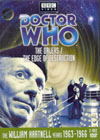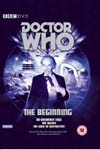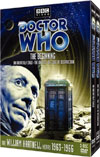DVD Extras include:
Episode One - The Dead Planet - directed by Christopher BarryThis is one of the best episodes of the seven-part Dalek story. As with "An Unearthly Child", this crucial 25-minute program was re-recorded a second time to work out all the technical hitches, a move which definitely paid off extremely well. Director Christopher Barry is in fine form, making all the scenes work. Writer Terry Nation is at his best getting the Doctor Who regulars to explore new worlds and new sci-fi ideas, which is what this episode is all about both inside and outside of the TARDIS. Other writers should have taken notes on how to use simple curiosity on behalf of the main characters in order to involve them in a story - it often attracts an audience's interest as well! Thankfully, the Doctor in particular has plenty to do, as he drives the plot with his lovable mischief. Tristram Cary's music makes a wonderful debut, as most of the pieces that will be re-used throughout the series get introduced in well-deserving scenes. The cliffhanger is a true classic, and one of the most famous at that. A great episode.
Episode Two - The Survivors - directed by Christopher BarryAfter episode one's polished lead-up, and in retrospect considering the Daleks' importance in Doctor Who as a whole, one approaches this half-hour episode with high expectations of the classic first encounter between the time traveller's group and his most deadly adversaries. It isn't all that exciting, or particularly well directed - the weakest in Chris Barry's contributions to this story. Our main characters spend most of their time sick, injured, or paranoid in a blank cell, while the Doctor Who production team has yet to find the best way to perform and shoot their new Dalek creations.On the plus side, David Graham and Peter Hawkins get their deep-grating Dalek voices spot on right from the start, which is more than can be said for their later work on "The Dalek Invasion of Earth" (story no. 10), "The Chase" (story no. 16), and "Mission to the Unknown" (story no. 19), where the highest ranking Dalek always seems to end up with the lamest, squeakiest voice. Perhaps having a good director to coach them makes all the difference. William Russell's wooden portrayal of apprehension is contagious and spreads to the others in this one during the much-touted "first Dalek scene", which doesn't really work. Despite Nation's apparent choice to use Ian as the all-round main character for this story, it is the Doctor who has a separate, exclusive interview with the Daleks, possibly the highlight of the episode. Susan's flopping about in the jungle isn't too impressive; however the thundering jungle with its mysterious wandering figure is very well done. Despite this, the cliffhanger doesn't really work - there is less anticipation of danger or a new discovery as there is of watching more of Susan flopping about in the jungle endlessly on the return journey, and it seems to have concluded where it did more for the technical consideration of not having to shoot the TARDIS interiors and the subsequent exteriors all on the same day.
Episode Three - The Escape - directed by Richard MartinThis episode improves over the previous one, and is I think, Richard Martin's best-directed half-hour episode ever. (How much of the pre-planning was done by Chris Barry, I wonder?) Terry Nation gives us the first example of his "mysteriously threatening figure which turns out to be a nice good guy" in Alydon, the first Thal that we meet. This Terry Nation archetype character will return with Tyler/Wyler in "The Dalek Invasion of Earth", Arbitan and Altos in "The Keys of Marinus" (story no. 5), Bret Vyon to some extent in "The Dalek Masterplan" (story no. 21), Bernard Horsfall's Thal character Taron in "Planet of the Daleks" (story no. 68) followed by the invisible Wester in the same story, the Exxilon "Bellal" in "Death to the Daleks" (story no. 72), Sevrin in "Genesis of the Daleks" (story no. 78), and Tyssan in "Destiny of the Daleks" (story no. 104). At least we are spared Susan's transition back through the jungle, now that Alydon's nature has been revealed.With the exception of Susan, our main characters are confined to the cell even more than previously, yet they also have more interesting things to do and scenes to perform. The Thals are introduced, and some great lines emphasize the contrast between them and the Daleks in the expertly juxtaposed scenes. The `action' at the end of the episode is pretty lame, with Ian pretty much pulling the Dalek suction cup up to his throat so he can get choked. Thankfully, Richard Martin does get it mostly right this time, making episode three one of the more enjoyable ones of the story. The cliffhanger is a vast improvement on the previous episode as well.
Episode Four - The Ambush - directed by Christopher BarryChristopher Barry comes back to the director's chair to do what I consider to be the best episode in the entire Dalek story. Three fascinating story beats keep interest running high, firstly throughout the action with the Dalek guard and the lift, as our main characters connive and battle their way to freedom. The directing is a little weak in unbelievably allowing Susan far too much time to decide to attempt to run away - a three-shot would have been faster and more believable than a slow pan across close-ups of the Doctor and Barbara before settling on Susan. Even better a quick three shot that zooms in on Susan as she makes her move (if such a thing was technically possible with the cameras of the day). The important element is to not waste time that would further arouse the Dalek's (and the audience's) suspicion. Also, the camera angle on the circular model lift is confusing; particularly the darker "underside" shots are upside down from what would be a more natural view.
Without wasting any time showing pointless transitional scenes of characters crossing from one set to another, we get the third story beat - the four travellers and the Thals have a friendly chat and take stock of their situation, while the Doctor takes a keen interest in the history of Skaro and its various cultures and peoples. More great Terry Nation style exploration beautifully written, acted, and directed. The cliffhanger is great, as the travellers realize they have to return to the city before they can leave, a point underscored by the horror on their faces and in Tristram Cary's music. The Doctor has lots to do in this one, but Ian is already emerging as the main character and beginning to steal the show by undertaking all of the crucial, heroic actions.
Episode Five - The Expedition - directed by Christopher BarryThe moral argument that ensues between the four main characters is a major attraction that sets this story apart from many of the formulaic Dalek sequels that appeared on Doctor Who in later years - it is well thought out and written by Terry Nation, and also well acted, directed, and shot by the cast and crew. Again, this is more than bug-eyed monster terror for tots. Ian really comes to the fore as the man of both action and moral conscience, outshining the Doctor and firmly taking over the heroic `main character' role for the rest of the story. Although William Hartnell's Doctor still has much to do in this half-hour episode, it is interesting to note how many of Ian's lines were later given to Peter Cushing's Doctor in the movie version of the story, rightly re-positioning the Doctor much closer to the heroic main character center.An interesting and excellent piece of music is played as Ian antagonizes the Thals, which doesn't quite fit here as well as it would do later for the advance of the aliens of Dido against the intruder in their temple next season. The Daleks have many scenes all on their own, something which doesn't always work in practice, but it gets pulled off well here, thanks to some expert direction. Finally we get to the swamp, which has a superb atmosphere thanks to a great montage of sound effects, more suspenseful direction, and minimal special effects `monster' shots. We get a nice creepy cliffhanger, too - it truly is more suspenseful to threaten minor characters, because the threat that the writer will actually bump them off is much, much more real and palatable to the audience.
Episode Six - The Ordeal - directed by Richard MartinThis episode is aptly named, because it is something of an ordeal to watch. If any of the episodes were created as last-minute story padding, this is the one! Most of our attention remains on Ian's party throughout, although their slow meanderings through the mountain caves are not very exciting. They could have been made darkly atmospheric, but this doesn't happen; the direction is rather bland, and there is little recognizable music in the episode until the very end, and even that doesn't really work.Richard Martin is sometimes listed as a director who was confident and exuberant in tackling the technical problems associated with studio sci-fi adventures, special effects, and the Daleks in particular. True, but in these early days here he doesn't seem to display much affinity for being successfully ARTISTIC about it - camera angles often miss the mark of drawing the audience's attention to the next most natural item of interest that would move the story forward, actors appear uninspired, and scenes lack the emotion intended for them in the writing. In the opening few shots, Ian says his lines while he is clumsily cut out of the shot by a slim margin and we are left to look at a collection of Thals standing around staring woodenly about. Later, Barbara and Ganatus crawl through the caves, stop, and Ganatus says, `Just look at that!' This is a truly lame moment, because the next most natural shot would be one of whatever they are looking at, which the director denies his audience. An actual shot might not actually help, because it is so dark that it might be impossible for the audience to actually make out anything. But we are left to stare at the blank faces of Barbara and the Thal, which give no clue to what should be taking our interest at this point. This is not suspenseful, merely confusing. Nation's dialogue is partly to blame, because simply changing the line to "Ahh, it's a dead end, Barbara." will end the confusion and draw the audience's attention to where it should be, where it can understand the actors' expressions and emotions, and not beg the audience to look at something they can't see. The Doctor makes his final heroic contribution, precisely one episode too early, and it isn't very well or believably directed either, but at least he has something crucial to do in the final struggle with the Daleks. Then he and Susan sit on the floor for story-time with the Daleks!!! What is this? Prepare for some low shots which do more to simply cut the Daleks' intelligent features out of the top of the shot than to make them look menacing - not proper low-angle shots aiming upwards which might work, just low shots aiming level to show the Daleks' studded skirts and lots of empty floor. In this strangely shot scene, a couple of classic lines exchange between the Doctor and the Daleks:
Doctor: "But that's sheer murder!"
Dalek: "No, extermination!"
Apart from one other brief mention in episode three,
the Daleks' favourite word has yet to become popular.
Antodus gives the only really interesting performance in the episode, with his mounting reluctance to march bravely forward. It's often hard to stay awake during the practically transitional swinging across the chasm, until Antodus gets his turn. His agonizing cries make the drama for the riveting cliffhanger, but Ian's silence is totally unbelievable at this point - he's kept his head about him all episode and looked after the entire party, so why is he suddenly so unable to call for the help that he and Antodus need (and later get next episode)?
Episode Seven - The Rescue - directed by Richard MartinDespite some more dodgy hit-and-miss direction from Richard Martin, the story's concluding episode is much more interesting and enjoyable than the better-directed episode three. The Doctor is most unfortunately confined against a wall with Susan until nine seconds before the drama's climax, and even when freed he is only able to stagger clumsily about a bit, and have a few odd last words with a Dalek. This may be one of the all-time classic William Hartnell stories, but don't look for a classic William Hartnell performance as the Doctor in its two concluding episodes - it just wasn't in the script. Ian is every bit the main character hero in this one, leading both his party and eventually Alydon's into the control room to attack the Daleks with clubs, ropes, and their bare hands. It's a very good thing the Daleks have some sort of city-wide power drain thing conveniently happening at the same time, because it's the only thing making this kind of an assault on the Daleks remotely credible in hindsight of their later exploits. That said, it's strange that the Daleks' ability to paralyse humanoids with their weapons was only seen once more in "Planet of the Daleks" - it opens up so much more in the way of story possibilities and Dalek deviousness if they have something in between vocal threats and all out killing.Antodus' death at the beginning of the episode is a good dramatic moment, and it is a shame that the movie version `Disney-ified' it to let him live, because it pretty much destroys the whole point of having a cave sequence, if indeed there is to be one beyond story padding. We get a good final piece of incidental music to underscore the despair of Ian's party in the caves, when they think they've come to a final dead end. The directing is `on' here, with very good lighting effects, and a proper and interesting looking cut-away shot as Ian finds a way into the heart of the city. The action-scenes are another matter. Most confusing is a sudden shot of a Thal crumpling to the floor in the famous `negative' effect - it is so badly placed in sequence and without a good view of his face that we have no idea where he is, who he is (is he a main Thal character or not?), what he was trying to do, how the Dalek found him, whether or not he gave away the position of Ian and the main group..... Perhaps strangest of all is the fact that neither Ian, nor the Doctor, nor Alydon, Ganatus, or any major Thal character deal the Daleks the blow to stop their final plans - rather it is a nameless Thal extra who momentarily survives a direct Dalek blast by what must be an act of sheer will, to drive the Dalek into a console - a foreshadowing of Stien's later final action in "Resurrection of the Daleks" (story no. 134), which more appropriately had a dramatic build-up throughout the story and was thus more satisfying. The Doctor's interference in the previous episode was not wide-spread enough to do much more than knock out a small defence system just long enough to let the main Thal party in. Ultimately, the Daleks do themselves in with their own greedy power drain, trying to give Skaro an extra melt-down. This `weakness' on their part may not fit with what they later became in the Doctor Who mythology, but it suits their original characters as single-story villains that they would not be able to sustain their complicated selves with no respect for the life surrounding them. Post-climax, the drama is satisfying once more, as the Doctor collects himself and William Hartnell is back on form again. The good-byes are well-done, a bit cold and stiff but then that is appropriate in this case. The dematerialization is satisfying, and a good shot of the travellers munching away in the console room while the Doctor adjusts controls all around the console gives us a good appetite for the next story. If you're lucky enough to be watching the un-edited version on DVD, we also get another cliffhanger leading into the next story. A good closing for a classic, and hats off to director Richard Martin for pulling it off.
International Titles:
This story has become available on DVD as the second adventure in "The Beginning" DVD box set. Although the popular original edition from 2006 has now become a rare item, a newer 2013 re-issue offers identical content at a more competitive price... Click on the amazon symbol for your area to open amazon's page in a new window and see additional product information before purchasing.
Comments on this article are welcome. You may contact the author from this page:
|
||||||||||||||||||||||||||||||||||||||||||||||||||||||



 2013
2013 2013
2013




